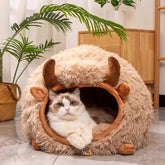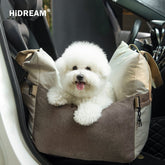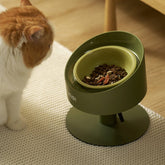Effective Ways to Control Litter Box Odor

Maintaining a fresh-smelling litter box is essential for a harmonious home environment and your cat's well-being. Unpleasant odors from the litter box can permeate your entire home, causing discomfort and possible health issues for both you and your cat. In this blog, we will discuss practical and effective ways to control litter box odors, ensuring a pleasant living space for all.
Understanding Litter Box Odor
To control litter box odor effectively, it's crucial to comprehend its root causes. The following are the main factors contributing to the noxious smell:
Accumulated urine and feces: Over time, as waste material builds up in the litter box, it releases malodorous gases, resulting in an unpleasant smell.
Bacterial growth and ammonia production: Bacteria present in the litter box decompose waste, producing ammonia. Ammonia has a strong, pungent odor, further contributing to the unpleasant smell.
Poor ventilation and inadequate cleaning: The lack of sufficient airflow and infrequent cleaning allows odor molecules to persist around the litter box area. Without adequate ventilation, the smell becomes trapped, worsening the problem.
Practical Solutions for Litter Box Odor Control
Here are some proven methods to effectively reduce litter box odor:
-
Scoop regularly: Develop a routine of scooping the litter box at least once or twice a day to promptly remove waste.
-
High-quality litter: Opt for high-quality litter known for its odor-absorbing properties. Clumping litters are particularly good at trapping odors.
-
Baking soda: Before adding litter, sprinkle a thin layer of baking soda at the bottom of the litter box to neutralize odors.
-
Proper ventilation: Ensure the litter box area is well-ventilated to let fresh air circulate and disperse unpleasant odors.
-
Clean the litter box regularly: Clean and disinfect the litter box thoroughly with a mild detergent on a weekly basis.
- Utilize an ion-based litter box deodorizer that automatically releases deodorizing agents, maintaining a consistently fresh litter box area.Opt for Enclosed Litter Boxes
Choosing a Fully Enclosed Litter Box
If odor control is a main concern, choosing an enclosed litter box over an open one can significantly improve your experience. Enclosed litter boxes are specially designed to contain and manage smells due to their closed structure. They provide a confined space that effectively reduces odor spread, creating a more pleasant environment for both you and your cat. With their exceptional odor control, enclosed litter boxes are a practical choice for those seeking an optimal odor-free litter box experience.

Factors to Consider for Odor Control in Cat Litter
When choosing a cat litter for odor control, consider several factors. Choose a litter with high absorbency to quickly soak up urine and prevent pooling at the bottom of the box, minimizing odor and keeping the box dry for longer. Opt for litter that clumps tightly when wet, making it easier to remove soiled litter and trapped odors for a fresher, cleaner box.
Choose a litter specifically designed to neutralize or mask odors. Litters with activated charcoal or baking soda additives effectively absorb and neutralize unpleasant smells, leaving the box smelling fresher.
Proper Litter Box Placement
The litter box placement is crucial to encourage your cat to use it consistently and minimize odor. Strategic placement ensures convenience, privacy, and a comfortable environment for your cat.
Tips for Ideal Litter Box Placement:
-
Choose a quiet and secluded area for the litter box, away from high-traffic areas or noisy appliances. Cats value privacy during their litter box use, making a peaceful corner or a dedicated room an ideal choice.
-
If you have more than one cat, provide each with a litter box, plus one extra. This prevents overcrowding and territorial disputes, ensuring each cat can access a litter box when needed.
-
Refrain from placing the litter box near loud appliances, such as washing machines or heaters. Noise and vibrations can make cats reluctant to use the box.
Regular Cleaning and Maintenance
We recommend scooping the litter box at least once or twice a day to remove solid waste and clumps. This regular upkeep minimizes odor accumulation and maintains a clean litter box for your cat.
Place the collected waste in a sealed bag and dispose of it in a suitable outdoor garbage bin. Some litter can be discarded via flushing it down the toilet, but avoid doing so in large quantities to prevent plumbing issues and environmental damage.
Step-by-Step Guide for Cleaning the Litter Box
-
Start by emptying the litter box and disposing of the used litter and waste. Use a scoop or a specific waste disposal bag for easy removal.
-
Thoroughly clean the litter box with warm water and a mild detergent to eliminate any residue or odor-causing bacteria. Rinse it thoroughly and ensure it's completely dry before proceeding.
-
Once dry, refill the litter box with a fresh litter layer, maintaining a depth of approximately 2-3 inches. Distribute the litter evenly for your cat's convenience.

Odor-Control Products and Techniques
These deodorizers are designed to neutralize litter box odors. They can be used directly near the litter or around the area to refresh the space. Deodorizing additives, meant to be mixed with the litter, contain substances that absorb odors. This helps diminish unpleasant smells and provides additional odor control alongside regular litter.
Air purifiers can assist in eliminating odor particles from the air, effectively decreasing litter box smells in the room. They offer ongoing odor control and enhance overall air quality.
Ventilation and Airflow
Ventilation plays a key role in reducing litter box odor as it circulates fresh air and prevents the accumulation of stagnant smells. Effective airflow can help diminish moisture and remove trapped odors in the litter box area.
Enhancing Airflow Around the Litter Box Area
-
Position a fan or air purifier near the litter box to enhance air circulation and diminish odor concentration. These devices can disperse lingering smells and foster a fresher environment.
-
Open windows or use exhaust fans near the litter box area to facilitate the exchange of indoor and outdoor air, thus improving ventilation and reducing odors.
-
Keep doors slightly open in the room with the litter box to enable free air flow, helping to prevent odor accumulation and improve ventilation.
By following these tips, you can increase airflow and ventilation around the litter box area, ultimately diminishing litter box odor and creating a more comfortable living space.
Cat Diet and Hydration
A cat's diet can greatly affect the odor of its waste. Certain foods can lead to more pungent urine and feces, thus intensifying litter box odor. Consequently, understanding the effect of diet is crucial in managing litter box smells.
To reduce litter box odor, provide your cat with a balanced, high-quality diet. Opt for cat foods specifically designed to support urinary health, as they can help decrease the concentration of odor-causing substances in the waste.
Keeping your cat well-hydrated is another effective way to lessen litter box odor. Higher water intake dilutes urine, making it less concentrated and therefore less smelly. Consider offering fresh water in several locations and using water fountains to promote hydration.
By choosing the right diet and encouraging hydration, you can positively affect your cat's waste composition and lessen litter box odor.

Behavioral Considerations
Sometimes, litter box odor issues can link to underlying behavioral problems. Cats might avoid the litter box due to stress, anxiety, or territorial disputes. Identifying and addressing these issues is essential to effectively tackle litter box odor problems. Consistent litter box training can help prevent improper elimination and reduce odor. Make sure to provide multiple litter boxes in easy-to-reach locations, use litter that your cat likes, and maintain a clean, comfortable environment. Positive reinforcement, like treats and praise, can also encourage proper litter box use.
Stress Reduction Techniques to Prevent Inappropriate Elimination
Lowering stress levels can help discourage cats from eliminating outside the litter box. Offer environmental enrichment, such as toys and scratching posts. Maintain a regular routine and create safe spaces for your cat to retreat. You might also want to consider using pheromone diffusers or consulting a veterinarian for more stress reduction techniques.
Conclusion
In conclusion, managing litter box odors is crucial for a healthy and harmonious home. By understanding the causes of litter box odor, choosing suitable litter, maintaining regular cleaning, ensuring good ventilation, and considering behavioral factors, you can effectively control litter box smell. A clean, odor-free litter box benefits your cat's well-being and improves the overall living environment. Implementing the strategies outlined will contribute to a fresher, more pleasant atmosphere, fostering a happy coexistence between you and your cat.























